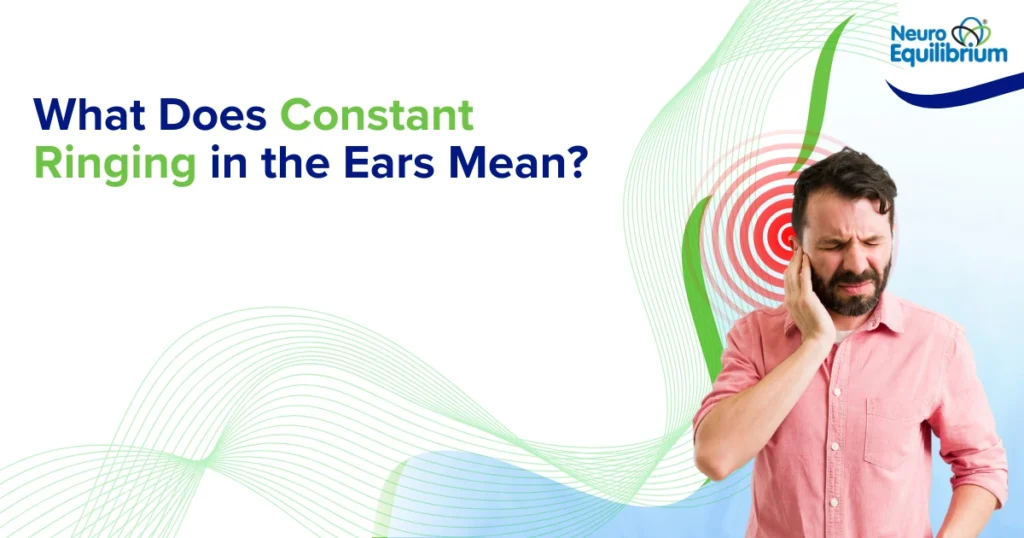Have you ever heard a slight ringing in your ears when there is no sound? Although a bit of phantom sound may not be a significant problem, persistent ringing in the ears may become annoying and distracting. The condition is referred to as tinnitus and is more prevalent than you may have imagined; however, it may also be an indication of an underlying health condition that requires treatment.
One should not ignore these repetitive sounds because they might be a signal that indicates that something is wrong. We’ll try to cover what tinnitus is, some of the most typical causes of it, and when you need to seek professional assistance.
Know More About Ear-Related Issues
- Is It Anxiety or an Ear Problem? How to Tell What’s Causing Your Dizziness
- Is It Just a Migraine or Something More?
- What Is Ear Balance Treatment and When Do You Need It?
What Is Tinnitus?
Simply put, tinnitus is the perception of sound when no external sound is present. For most people, this is a subjective experience, meaning only you can hear it. This is the most common form of tinnitus. In rare cases, some people have objective tinnitus, which means the sound is audible to others, often through a doctor’s stethoscope. This type is usually related to muscle contractions or blood vessel issues. The sounds of tinnitus can vary widely. People describe them as ringing, but they can also sound like buzzing, hissing, clicking, or even roaring. These sounds can come and go or be a continuous presence, and their intensity can range from barely noticeable to a debilitating roar.
| Aspect | Subjective Tinnitus | Objective Tinnitus |
| Who Can Hear It | Only the affected person | Can be heard by others, often through a doctor’s stethoscope |
| Prevalence | The most common form of tinnitus | Rare |
| Cause/Source | Often linked to inner ear or auditory nerve issues | Often related to muscle contractions or blood vessel problems |
| Common Sounds | Ringing, buzzing, hissing, clicking, roaring | Similar to subjective but may have rhythmic patterns |
| Frequency & Intensity | Can be intermittent or continuous; intensity ranges from mild to severe | May come and go; intensity depends on underlying cause |
Common Causes of Constant Ringing
Tinnitus is not a disease, but a symptom. The noise that you get is usually an indication that there is something going on in your hearing system.. Some common causes include:
- Loud Noises: This is among the one of the most common causes. Ringing in ears can develop as a result of attending concerts frequently, listening to loud music with headphones, or exposing yourself to noise at the workplace.
- Age-related hearing loss: Hearing loss is a natural part of ageing. Tinnitus may accompany this process, when the auditory system attempts to compensate for the loss of sound.
- Earwax buildup: A simple obstruction due to too much earwax can annoy the eardrum and lead to ringing. This is easily one of the things that can be corrected.
- Ear Infections or Fluid in the Ear: Ear infections or trapped fluid behind the eardrum can interfere with how sound waves are processed. This can lead to tinnitus.
- Ototoxic Medications: A side effect of ototoxic medications such as some antibiotics, aspirin, and diuretics, may result in the onset or aggravation of tinnitus.
- Head or Neck Trauma: Damage to the neck or head may involve nerves and circulation regarding hearing and may cause chronic tinnitus.
- Meniere’s Disease: This is a disorder in which fluid pressure in the inner ear elevates. Meniere’s is commonly linked to a group of symptoms such as a shifting hearing loss, vertigo spells, and tinnitus in one ear.
- Stress and Anxiety: Stress is one of the factors that may cause or aggravate the symptoms of tinnitus in a vicious cycle, since the symptoms lead to additional stress.
When Should You Be Concerned?
While occasional and temporary ringing in the ears usually isn’t cause for concern, it’s advisable to consult a doctor if it becomes persistent. Taking care of your health and seeking professional guidance can provide peace of mind. Consider seeing a healthcare provider if:
- Your tinnitus lasts more than a week.
- The ringing occurs in only one ear.
- You experience dizziness, pain, or sudden hearing changes alongside the ringing.
- The sound disrupts your sleep or everyday activities because it is too loud.
- The tinnitus started after a head injury.
Can Ringing in the Ears Be Cured?
There is no universal cure to tinnitus, yet it is usually curable, especially where the underlying cause is dealt with. When the tinnitus is provoked by a factor that can be reversed, such as presence of ear infection, presence of wax in the ear canal, effective treatment may cause the tinnitus to completely heal. When it is chronic or long-lasting the treatment aims at making the sound less sharp and making you coexist more easily/peacefully with the sound, however bad it may be.
Treatment Options for Tinnitus
1. Fix the Root Cause
Since tinnitus is usually a symptom of something else, treating that issue can sometimes cure it: Earwax buildup: An ENT can safely remove excess wax that’s clogging the ear canal. Ear infection: Antibiotics or anti-inflammatory medications can help relieve swelling and eliminate the infection. TMJ disorder (jaw joint issue): Dentists, orthodontists or ENT doctors may propose exercises, bite guards or jaw realignment therapy.
2. Sound-Based Therapies
To mask or reduce the sensation of tinnitus, these methods use soft background sounds like white noise or nature sounds. These can be played on a phone app, sound machine, or special device. Masking-type hearing aids are also especially beneficial when tinnitus occurs alongside hearing loss. Tinnitus Retraining Therapy (TRT) involves counseling and sound therapy to help you ignore the ringing.
3. Mindfulness and Cognitive Behavioral Therapy (CBT)
These methods can help reduce stress and change your reactions to tinnitus: Focused breathing involves inhaling through the nose for 4 seconds and exhaling for 6 seconds, repeating 10 times to promote relaxation and lessen anxiety. Body scan meditation entails resting each body part and observing the tinnitus without judgment. Cognitive restructuring encourages replacing negative thoughts like “this will never end” with more realistic ones, such as “it varies and I have managed before.” Behavioral activation suggests continuing to engage in enjoyable activities to keep your mind occupied.
4. Nutrition for Ear and Brain Health
Low levels of iron and zinc can make tinnitus worse. Eating nutrient-rich foods or taking supplements under medical guidance can help protect inner ear health and support better hearing over time.
How NeuroEquilibrium Can Help
Dealing with constant ringing in your ears can be challenging, but you are not alone. While tinnitus is a common condition, it should never be ignored if it affects your sleep, concentration, or overall well-being. The key to relief lies in identifying and addressing the underlying cause.
At NeuroEquilibrium, our specialists use advanced diagnostic tools to pinpoint the root of tinnitus and related balance issues. We offer comprehensive hearing and balance tests, personalized referrals, and multidisciplinary treatments tailored to your needs. With the right diagnosis and care, tinnitus is highly manageable. Take the first step toward clearer and quieter living by booking your assessment with NeuroEquilibrium today.
Sources
- “Tinnitus: What Is It? Causes and Treatment.” National Institute on Deafness and Other Communication Disorders (NIDCD). https://www.nidcd.nih.gov/health/tinnitus (NIDCD)
- “Tinnitus Treatments & Management.” Eastern Carolina ENT Head & Neck Surgery. https://www.easterncarolinaent.com/hearing/tinnitus/tinnitus-treatments (Eastern Carolina ENT)
- “Tinnitus: Diagnosis, Causes, Mechanisms, and Treatments.” BMJ / PMC article. https://pmc.ncbi.nlm.nih.gov/articles/PMC2686891/ (PMC)
- “Tinnitus – Overview.” MedlinePlus. https://medlineplus.gov/ency/article/003043.htm (MedlinePlus)
- “Tinnitus: Causes, Symptoms, and Treatment.” Apollo Hospitals – health library. https://www.apollohospitals.com/health-library/tinnitus-symptoms-causes-and-treatment (Apollo Hospitals)
- “Tinnitus: Causes, Symptoms, and Treatment.” Healthdirect Australia. https://www.healthdirect.gov.au/tinnitus (Health Direct)
- “Tinnitus Treatments: Managing the Condition.” American Tinnitus Association (ATA). https://www.ata.org/about-tinnitus/therapy-and-treatment-options/medications/ (ata.org)
Is ringing in the ears always a sign of something serious?
Not necessarily. It may be associated with conditions such as Meniere disease or hearing loss, but it may also develop due to temporary problems such as earwax accumulation or exposure to a loud noise. Nevertheless, when the ringing is persistent or when it is accompanied by other symptoms, it would be prudent to have it examined by a pro.
Can stress cause tinnitus?
Yes, it is known that stress and anxiety can cause or exacerbate tinnitus perception. The stress response of the body may increase your sensitivity to the internal sounds and may become more annoying.
How is tinnitus diagnosed?
A diagnosis typically consists of a thorough medical history, physical ear examination and hearing test (audiometry). In case of suspected vestibular problem, your doctor may also prescribe special balance and inner ear functions tests.
What is the difference between subjective and objective tinnitus?
Subjective tinnitus is the most prevalent type, in which only the affected person can hear the sound. Objective tinnitus is uncommon and can be heard by a doctor during an examination which is usually due to a physical sound source inside the body.
Can tinnitus go away on its own?
In some cases, yes. Tinnitus caused by temporary issues like earwax buildup, short-term noise exposure, or mild ear infections may resolve once the underlying cause is treated or heals naturally. However, chronic or persistent tinnitus often requires medical evaluation and management.
















